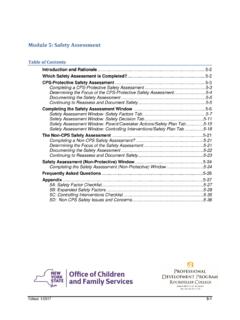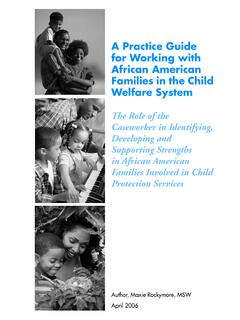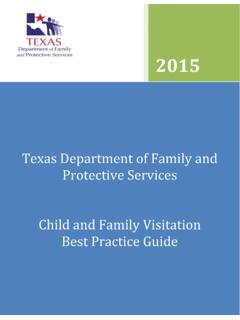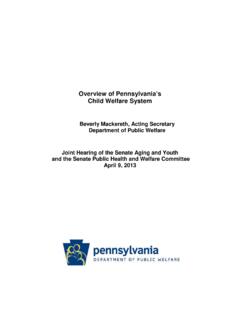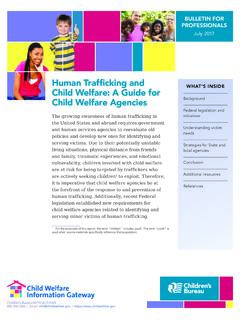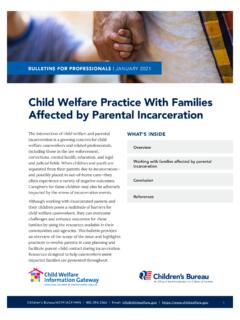Transcription of A Social Worker’s Guide to Working with Children
1 A Social Worker's Guide to Working with Children A Social Worker's Guide to Working with Children Introduction to Social The Centers for Disease Control and Prevention (CDC) identifies individual, family, Work for Child Welfare and community risk factors common among families that are at risk for abuse and/or neglect. Neglect and abuse are more likely to Social workers play integral roles in educating, occur in families with the following risk factors: counseling, and supporting individuals and families who are at risk of being marginalized Children under age four for various reasons, including culture, income, Special needs Children (physical or mental). location, and education. They can address many of their clients' challenges through Parents who were abused as Children careful ethical and strategic intervention.
2 Parents who are uneducated about child Professionals specializing in child welfare work rearing for government agencies, nonprofits, private Parents who are young, poorly educated, agencies and healthcare companies where their have low incomes, or who are responsible work takes them to private homes, schools, for a large number of Children hospitals and clinics. Single parents and/or households with a Because child welfare work is so sensitive, non-biological provider in the home such as Social workers need to be equipped with a single parent's romantic partner a solid educational background, as well as Highly stressed parents proper certification and state licenses. Such preparation and qualification imbues Social Families that lack interaction skills and workers with an ethical knowledge base and that have formed inadequate parent-child gives them the ability to diagnose a family's relationships needs, create an intervention plan, help Families that are socially alienated implement the plan and monitor and evaluate Families with violent tendencies or that live the effectiveness of it.
3 In violent communities Who Are the Children and Families that Families living in impoverished areas with high unemployment Need Assistance? The CAPTA Reauthorization Act of 2010 defines Despite these identified risk factors, it's abuse and neglect as: important to note that families can be living in at-risk circumstances without engaging in child Any recent act or failure to act on the part of maltreatment, just as families with no at-risk a parent or caretaker, and factors can be abusing or neglecting Children . The act or failure to act results in death, serious physical harm, sexual abuse or What are the Needs of These Children ? exploitation;. Professionals such as counselors, teachers, Or an act or failure to act that represents an and caseworkers who work with Children are imminent risk of serious harm.
4 Trained to recognize signs of abuse and neglect. Neglect can be physical, medical, educational, or emotional; abuse can be physical, sexual, emotional, or substance-based. Without proper intervention, the negative impacts of abuse and neglect on a child can be life long. A Social Worker's Guide to Working with Children Aside from the potential for a victim to repeat that Social workers encounter in professional the cycle of abusive or neglectful behavior settings. It directs the core competencies with their own Children , victims may suffer essential for Social work specializing in Working emotional, physical, and developmental delays. with Children . The core values and broad ethical They are more prone to consequential, harmful principles are: behaviors like drug and alcohol abuse, sexual promiscuity, and obesity, according to the Service Department of Health & Human Services.
5 Helping those in need Social Justice The 2012 CDC study The Economic Burden of Advocating for reform Child Maltreatment in the United States and the Implications for Prevention, describes how Dignity and Worth these consequences extend beyond victims Respecting the worth of client and into society with costs soaring around Human Relationships $124 billion to address the estimated 3 million Recognizing the essence of human annually reported abuse and neglect cases. relationships Among the hundreds of thousands of cases Integrity classified as maltreatment, 1,740 were cases Engaging in trustworthy behavior in which the victim died. For this reason, the needs of Children are a focal point in various Competence areas of health and well-being, such as: Practicing within their realms of expertise and pursuing professional development Spiritual Cultural Medical Places Where Social Dental Workers Work Social Most Social workers are employed by private, Educational public and nonprofit agencies, and their work Mental takes place in a variety of locations including schools, residential group homes, military agencies, federal facilities and hospitals and How the NASW Code of Ethics Guide clinics.
6 Social Workers Social Worker vs. Counselor The NASW Code of Ethics is based on the values and primary functions of Social work, which Social workers who work with Children often are to ensure that people's basic needs are spend time in schools, where counselors are met, improve their well being, empower those also employed. While similar in many ways, in undermined positions, and address factors Social workers and counselors differ in a few that negatively impact daily living. The Code important areas: of Ethics is a guiding body of knowledge for cultural, communicative, personal, financial, Social , religious, intellectual, and other conflicts A Social Worker's Guide to Working with Children Similarities and if necessary on behalf of the Both provide counseling services to client.
7 Individuals, families, and groups Both help clients actualize their problems and cope with them Social Worker's Core Master's degrees are generally preferred or required in both fields Competencies Knowledge of Child Development, Parenting, Differences and Family Dynamics: As Children grow and Social workers strive to improve society as a mature, their needs and abilities to understand whole, while counselors focus on individuals grow and mature. Social workers who work and family units with Children must understand the stages of childhood development. Social workers also help clients ensure their basic needs such as food, clothing and Recognizing Signs of Child Endangerment shelter are met Social workers must understand behaviors and Social workers advocate for clients in legal attitudes that signal abuse and neglect, such arenas as increased anxiety, aggression, depression, not wanting to go home, or even fear of certain Social Workers' Roles Residential Group people.
8 Homes, Hospitals and Clinics Cultural Influences Social workers need to understand how factors For people who are not able to care for such as culture, location, living arrangements, themselves and do not have family and friends and socioeconomic status affect the ethical to look out for their needs, Social workers help development and implementation of a plan of them with day-to-day activities and ensure action. proper care. Community Systems for Assistance In residential group homes, Social workers Another aspect of Social workers' roles with help clients develop life skills that allow families and Children is creating a helpful them to live as independently as possible. community that can provide legal, medical, They help patients overcome and cope with mental health and financial support to families mental, behavioral, and physical limitations, in need.
9 And they ensure that their clients have access to services that can help them. Knowledge of Laws and Regulations In hospitals and clinics, Social workers help The NASW Standards for Social Work Practices patients with mental illnesses and medical in Child Welfare Standards 2012 say that Social issues and their families cope with and adapt workers must maintain a robust knowledge of to their circumstances. They direct them local, state, and federal regulations, politics, to other resources that will provide care, and legislations. This enables Social workers to education and support. present cases in legal settings, to encourage policy change and advocate on behalf of victims In all settings, Social workers have the and clients.
10 Additional important role of advocating when When a child must be separated from his or her family, Social workers oversee the transitions in and out of foster care, including when Children might reunify with their families. A Social Worker's Guide to Working with Children A Social Worker's Role in attitudes and behaviors relative to the foster child. Foster parents might be trained in Foster and Kinship Care cultural sensitivity, behavior management, and developmental disabilities. Programs Cultural sensitivity training applies when the child is of a different race, ethnicity, or When a child must be separated from his or her culture than the foster parent(s). family, Social workers oversee the transitions in and Behavior management training is necessary out of foster care, including when Children might when the foster child has behavioral issues reunify with their families.
